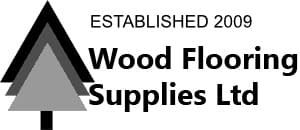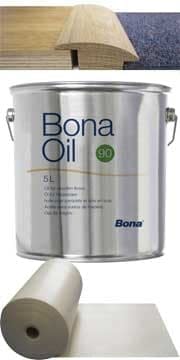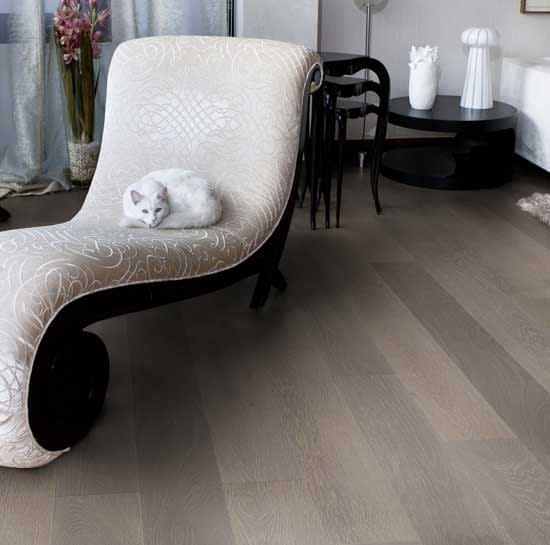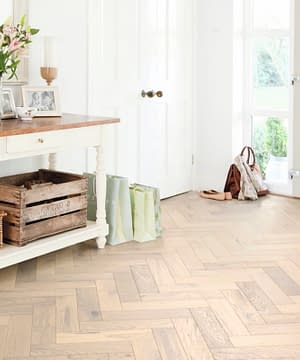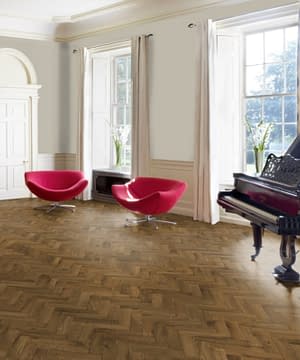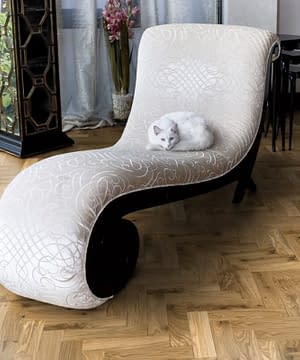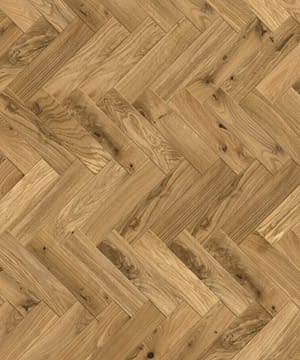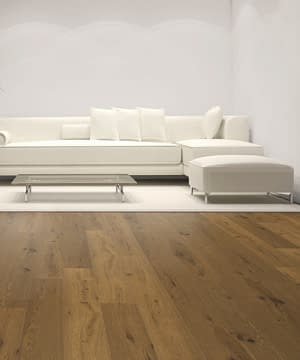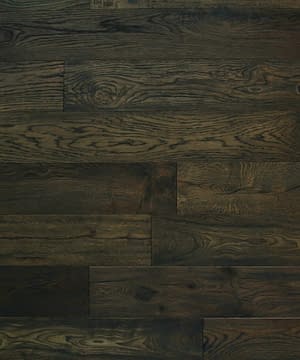Engineered Wood Flooring
Pros And Cons Of Engineered Wood Flooring
Have you ever wondered what the pros and cons of engineered wood flooring are? Please have a read of this; it will help you decide on your future purchase.
Few flooring options can match the popularity of wood flooring! Everyone wants it, and if they can’t get it, they want flooring that at least imitates the look of it. Hardwood flooring is undeniably stylish and timeless, so it’s easy to see why it is so popular.
Engineered wood flooring is a variant of hardwood flooring, with the main difference being that the wood is not 100% solid wood flooring. That might sound bad, but it’s important to remember that the engineered hardwood top layer is real wood.
The top layer of wood veneer surface is the only layer people will see, which is 100% real wood. The lower multiple layers are made from multilayer plywood, spruce pine, or HDF.
So, it isn’t a total 100% hardwood floor, but it is close to it. Most people won’t even be able to tell the difference once the flooring is installed. So, now you know more about engineered hardwood, let’s look at the pros and cons of this flooring in more detail.
What are the pros and cons of engineered wood flooring?
Engineered wood flooring offers several advantages, such as being more resistant to moisture than solid hardwood, making it suitable for areas like kitchens. It also provides dimensional stability due to its layered structure of compressed materials. However, the drawbacks of engineered wood include a limited refinishing capability compared to solid wood; while some engineered boards can be sanded down, many cannot be refinished multiple times due to their thin wear layer.
Is engineered wood flooring a good choice for kitchens?
Yes, engineered wood flooring is often a good choice for kitchens because of its resistance to moisture and wear and tear. Unlike solid hardwood, which can warp or swell with humidity, engineered wood can handle the fluctuating conditions typically found in kitchens, making it a practical alternative.
How does the installation method of engineered wood flooring differ from laminate flooring?
The installation method for engineered wood flooring can vary based on the product. Many engineered wood options feature a floating floor design, where boards are glued together or clicked into place. In contrast, laminate flooring typically uses a similar floating installation but may require different underlayment. Both types are generally DIY-friendly, allowing homeowners to save on installation costs.
Can you refinish engineered wood flooring?
Yes, some types of engineered wood flooring can be refinished, but the number of times you can refinish them is limited. The floor’s top layer thickness determines this capability; thicker layers allow for more sanding compared to thinner options. It’s essential to check the specifications of your engineered boards before attempting refinishing.
What are the long-term maintenance requirements for engineered wood flooring?
Engineered wood flooring requires regular cleaning and maintenance to keep it looking its best. Regular sweeping or vacuuming helps prevent dirt and debris from scratching the surface. Additionally, periodic maintenance such as occasional cleaning with a damp mop and using recommended cleaning solutions will help preserve the floor’s appearance and durability.
How does engineered wood compare to solid hardwood in terms of durability?
Engineered wood is often more durable in terms of resistance to moisture and environmental changes compared to solid hardwood. The layered construction makes engineered flooring less prone to warping and splitting, which is a common issue with solid wood in humid conditions. However, solid hardwood can be sanded and refinished multiple times, which can extend its lifespan if properly maintained.
What plank sizes are available for engineered wood flooring?
Engineered wood flooring comes in a variety of plank sizes, allowing homeowners to find the perfect fit for their space. From wide planks that create a dramatic effect to narrower options that can make a room feel longer, the choice available caters to different aesthetic preferences and room sizes. Choosing the right size can significantly impact the overall look and feel of your flooring.
Can engineered wood flooring be used with underfloor heating?
Yes, engineered wood flooring is suitable for use with underfloor heating systems. Its structure allows it to handle the changes in temperature without significant expansion or contraction, unlike solid wood. However, it is essential to follow the manufacturer’s guidelines to ensure compatibility and avoid potential damage from excessive heat.
What are the most common drawbacks of engineered wood flooring?
The drawbacks of engineered wood flooring include limited refinishing capabilities, potential for damage from water if not properly maintained, and susceptibility to scuffs and scratches in high-traffic areas. Additionally, while engineered wood can offer the same aesthetic to real hardwood, some consumers may prefer the authenticity of a solid wood floor.
- Cost-Effective: Engineered wood flooring is typically more affordable than solid hardwood flooring, making it a popular choice for budget-conscious homeowners.
- Stability: Due to its layered construction, engineered wood is less prone to warping and swelling compared to solid wood, especially in areas with fluctuating humidity.
- Easy Installation: Many engineered wood flooring products come with a click-lock design, allowing for easier and faster installation.
- Versatility: Engineered wood can be installed in various settings, including basements and over radiant heating systems, where solid wood may not be suitable.
- Eco-Friendly Options: Some engineered wood products are made from sustainable materials, which can be a more environmentally friendly choice.
Cons of Engineered Wood Flooring
- Limited Refinishing: Unlike solid hardwood, engineered wood can only be sanded and refinished a limited number of times due to its thinner veneer layer.
- Potential for Damage: While it is durable, the surface layer can be susceptible to scratches and dents, especially if not maintained properly.
- Chemical Emissions: Some engineered wood flooring products may contain adhesives or finishes that release volatile organic compounds (VOCs), which can affect indoor air quality.
- Aesthetic Variability: The appearance of engineered wood can vary between brands, and some may not replicate the look of solid hardwood as well as others.
- Resale Value: While engineered wood can add value, it may not increase the home’s value to the same extent as solid hardwood flooring.
In conclusion, considering the pros and cons of engineered wood flooring can help you make an informed decision. If you prioritize stability, cost-effectiveness, and ease of installation, engineered wood might be the right choice for you. However, if you desire the longevity and refinishing potential of solid hardwood, you may want to weigh those factors carefully before making a decision.
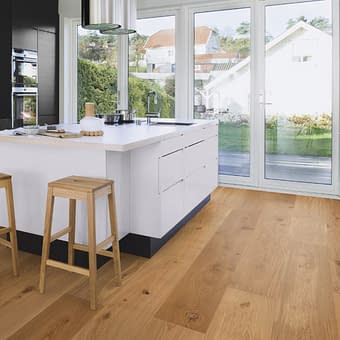
Pro: The Price
Although the classic charm of hardwood flooring is highly desired, it can also come with a hefty price tag. As a result, many homeowners opt for imitation hardwood options, such as laminate. However, engineered hardwood flooring is an excellent option if you’re looking for a happy medium between cost and authenticity. While it may be pricier than laminate or vinyl, it’s still less expensive than traditional hardwood flooring. Engineered hardwood is unique because it looks and feels just like traditional hardwood, yet it’s often more affordable. If you want the aesthetic appeal of hardwood without breaking the bank, engineered hardwood flooring is the perfect solution.
Just Some Of Our Engineered Flooring –
Check our Products on Sale!
Pro: Stylish
Engineered hardwood will look the same as traditional hardwood flooring on the surface, so it looks incredibly stylish. It is also available in many different finishes. If you have a particular wood you are fond of, you will likely find it in an engineered form. The main appeal of hardwood flooring is its timeless look, which you will get with an engineered wooden floor. Engineered oak flooring is by far the most popular wood floor, and this comes in a multitude of finishes and colours.
Pro: Greater Temperature Resistance
One of the key benefits of choosing engineered hardwood flooring over traditional hardwood is its increased resistance to moisture and temperature changes. This is due to the unique way in which engineered hardwood is formed. Unlike traditional hardwood, which is cut directly from a tree and prone to shrinkage and swelling, engineered hardwood is made up of multiple layers of wood that are bonded together with adhesive. This construction method helps to minimise the effects of moisture and temperature fluctuations on the wood, making it a more durable and long-lasting flooring option.
In addition to its resilience, engineered hardwood flooring is compatible with water-fed underfloor heating systems. This makes it an excellent choice for homeowners who want to incorporate modern heating technology into their home renovations. By choosing engineered wood flooring, you can enjoy hardwood’s beauty and warmth while benefiting from its practical advantages. Whether you’re renovating your entire home or just updating a few rooms, engineered hardwood flooring is a versatile and reliable choice.
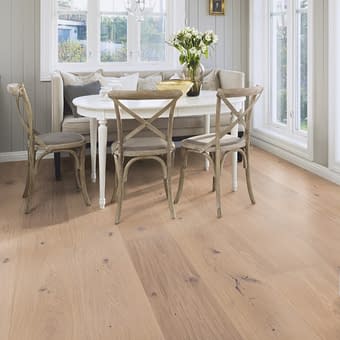
Pro: Adds Value To Your Home
When it comes to adding value to your home, installing hardwood flooring is a popular strategy employed by many homeowners. If properly installed, hardwood flooring can significantly increase your home’s overall value, making it an attractive investment. However, engineered hardwood flooring is a great alternative if you’re looking for a more cost-effective option that can still offer long-term value. Not only does it provide the same level of aesthetic appeal as traditional hardwood, but it also offers added durability and versatility. Even if you’re not planning on selling your home anytime soon, investing in engineered hardwood flooring can pay off in the long run.
Con: Maintenance
Hardwood flooring of any kind will take quite a lot of maintenance to keep its shine and lustre. Engineered wood is the same in this respect; therefore, it is only particularly suitable for homes with pets or young children if you are prepared to keep up with regular maintenance.
Con: Potentially Weak
There is a lot of variety in engineered hardwood flooring; some manufacturers will use very cheap and weak materials to build their flooring. It might look good on the surface but becomes very weak and unstable after just a short time. Do your research when buying engineered hardwood flooring to ensure you buy from a high-quality manufacturer.
Con: Fading
Colour changing is another con that engineered hardwood shares with traditional hardwood flooring. Too much contact with UV rays will cause the wood to fade, and this isn’t a problem that can be easily fixed if left for too long. Thankfully, you can minimise the risk of fading by keeping your curtains/ blinds closed or using some rugs to cover more vulnerable areas.
The Verdict
So, what is the final verdict on engineered hardwood flooring? While there are some cons to be aware of, many of these are issues you would also experience with traditional hardwood flooring.
Opting for engineered hardwood flooring is not necessarily a compromise. You can achieve an equally chic and enduring aesthetic at a potentially lower cost. However, it is crucial to select your engineered flooring from a reputable manufacturer and commit to proper maintenance to guarantee a stunning and long-lasting floor.
Here is a link to all the engineered flooring we sell.

